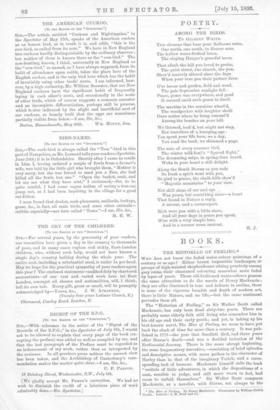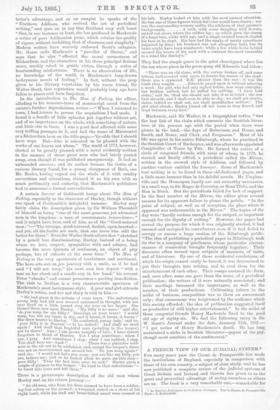BOOKS.
THE HISTORIAN OF FEELING.* WHO does not know the faded water-colour paintings of a century or so ago P Either brown impossible landscapes, or groups of high-waisted shepherdesses sitting pensively among grey ruins, their chastened colouring somewhat more faded by lapse of years. Those old-fashioned water-colours possess the same attraction as do the novels of Henry Mackenzie ; they are alike Chastened in tone and delicate in outline, there is none of the vigorous breadth and depth of modern art, there is little Nature, and no life,—but the same sentiment pervades them all.
The "Historian of Feeling," as Sir Walter Scott called Mackenzie, has only been dead sixty-two years. There are probably some elderly folk still living who remember him in his old age and their early youth ; and yet, in taking up his best-known novel, The Man of Feeling, we seem to have put back the clock of time far more than a century. It was pub- lished in 1771—the year that Smollett died, and three years after Sterne's death—and was a decided imitation of the Sentimental Journey. There is the same abrupt beginning, the same fragmentary narrative,—consisting of brief episodes and descriptive scenes, with more pathos in the character of Harley than in that of the imaginary Yorick, and a corre- sponding lack of humour. Mackenzie himself calls the book "recitals of little adventures, in which the dispositions of a man, sensible to judge, and still more warm to feel, had room to unfold themselves." Sir Walter Scott compares Mackenzie, as a novelist, with Sterne, not always to the * The Man of Feeling. By Henry Mackenzie. Illuctrated by William Onbitt Cooke. London: J. M. Dent and Co.' latter's advantage, and as an essayist he speaks of the " Northern Addison, who revived the art of periodical writing," and goes on to say that Scotland may well boast "that, in one instance at least, she has produced in Mackenzie a writer of pure Addisonian prose, which retains the quality of vigour, without forfeiting that of clearness and simplicity." Modern writers have scarcely endorsed Scott's eulogium. Mr. Gosse calls Mackenzie a " parodist of Sterne," and says that he also " affected the moral earnestness of Richardson, and the characters in his three principal fictions move, meekly robed in gentle virtue, through a series of heartrending misfortunes. There is no observation of life, no knowledge of the world, in Mackenzie's long-drawn lachrymose novels of feeling." In fact, without the prop given to his literary reputation by his warm friend, Sir Walter Scott, that reputation would probably long ago have fallen to pieces and been forgotten.
In the introduction to The Man of Feeling, the editor, alluding to his treasure-trove of manuscript saved from the curate's further depredations, writes :—" When I returned to town, I had leisure to peruse the acquisition I had made. I found it a bundle of little episodes put together without art, and of no importance on the whole, with something of nature, and little else in them. I was a good deal affected with some very trifling passages in it, and had the name of Marmontel OT a Richardson been on the title-page,—'tis odds that I should have wept. But—One is ashamed to be pleased with the works of one knows not whom." The world of 1771, however, elected to be greatly pleased with a novel evidently written in the manner of those great men who had lately passed away, even though it was published anonymously. It had an unbounded success ; and its author became the victim of a curious literary fraud, for a young clergyman of Bath, one Mr. Eccles, having copied out the whole of it with sundry corrections and alterations, claimed it as his own with so much pertinacity and audacity, that Mackenzie's publishers had to announce a formal contradiction.
A certain flavour of Goldsmith hangs about The Man of Feeling, especially in the character of Harley, though without one spark of Goldsmith's delightful humour. Harley may fairly claim the description given by Sir William Thornhill of himself as being "one of the most generous yet whimsical men in the kingdom ; a man of consummate benevolence; " and it might have been said of him, as of the "Good-natured man : "—" The strange, good-natured, foolish, open-hearted— and yet, all his faults are such, that one loves him still the better for them." Even Sir Walter Scott allows that " sketched by a pencil less discriminating, Harley, instead of a being whom we love, respect, sympathise with and admire, had become the mere Quixote of sentiment, an object of pity perhaps, but of ridicule at the same time." The Man of Feeling is the very apotheosis of tearfulness and sentiment. The hero sets out on ,his journey with a smile, as if he had said " I will not weep," his aunt sees him depart " with a tear on her cheek and a caudle-cup in her hand," his servant Peter " choaks " and cannot pronounce a parting benediction. The visit to Bedlam is a very characteristic specimen of Mackenzie's most lachrymose style. A poor mad girl attracts Harley's notice, and her sad story is told to him :— " He had given it the tribute of some tears. The unfortunate young lady bad till now seemed entranced in thought, with her eyes fixed on a little garnet ring she wore on her finger. She turned them now upon Harley. My Billy is no more !' said she, 'do you weep for my Billy ? Blessings on your tears ! I would weep, too, but my brain is dry, and it burns, it burns, it burns 1' She drew nearer to Harley. Be comforted, young lady,' said he, your Billy is in Heaven.'—' Is he, indeed? And shall we meet again ? And shall that frightful man (pointing to the keeper) not be there P Alas ! I am grown naughty of late ; I have almost forgotten to think of Heaven. Yet I pray sometimes ; when I can, I pray. And sometimes I sing ; when I am saddest, I sing. You shall hear me—hush There was a plaintive wild- ness in the air not to be withstood, and except the keeper's, there was not an unmoistened eye around her. Do you weep again P' said she. I would not have you weep; you are like my Billy, you are, believe me; just so he looked when he gave me this ring— poor Billy 'Twas the last time ever we met !' Harley gives a couple of guineas to the keeper : Be kind to that unfortunate'— he burst into tears and left them."
There is a picturesque description of the old man whom Harley met on his return journey :— " An old man, who from his dress seemed to have been a soldier, lay fast asleep on the ground ; a knapsack rested on a stone at his right hand, while his staff and brass-hilted sword were crossed at
his left. Harley looked at him with the most earnest attention. He was one of those figures which Salvator would have drawn ; nor was the surrounding scenery unlike the wildness of that painter's
backgrounds A rock, with some dangling wild flowers, jutted out above where the soldier lay ; on which grew the stump of a large tree, white with age, and a single twisted branch shaded his face as he slept. His face had the marks of manly comeliness impaired by time ; his forehead was not altogether bald, but its hairs might have been numbered ; while a few white locks behind crossed the brown of his neck with a contrast the most venerable to a mind like Harley's."
They find the simple grave in the quiet churchyard where lies the son whose place in the press-gang old Edwards had taken : " There was an old stone, with the corner broken off, and some letters, half-covered with moss, to denote the names of the dead : there was a cyphered ' RE.' plainer than the rest it was the tomb they sought.. . . Edwards gazed upon it without uttering a word : the girl, who had only sighed before, now wept outright her brother sobbed, but he stifled his sobbing. I have told sister,' said he, 'that she should not take it so to heart ; she can knit already, and I shall soon be able to dig : we shall not starve, sister, indeed we shall not, nor shall grandfather neither.' The girl cried afresh ; Harley kissed off her tears as they flowed, and wept between every kiss."
Mackenzie, said Sir Walter, in a biographical notice, "was the last link of the chain which connects the Scottish litera- ture of the present age with the period when there were giants in the land,—the days of Robertson, and Hume, and Smith, and Home, and Clerk, and Fergusson." Most of his life was spent in his native Edinburgh, where he practised in the Scottish Court of Exchequer, and was afterwards appointed Comptroller of Taxes by Pitt. He formed the centre of a circle of congenial friends, with some of whom, in 1779, he started, and finally edited, a periodical called the Mirror, written in the avowed style of Addison, and followed by another venture entitled the Lounger, Some of Mackenzie's best writing is to be found in those old-fashioned pages, and a little more humour than in his doleful novels. Mr. Umphra- vine and the Homespun family are not unworthy successors, in a small way, to Sir Roger de Coverley, or Beau Tibbs, and the Man in Black. But the periodicals failed for lack of support. In the final number of the Mirror, the editor gives several reasons for its apparent failure to please the public. "In the point of subject, as well as of reception, the place where it appeared was unfavourable to the Mirror." The topics of the day were "hardly various enough for the subject, or important enough for the dignity of writing." However, the paper had served the purpose for which it was originally started, it had amused and occupied its contributors even if it had failed to occupy or amuse a large section of the Edinburgh public- " The idea of publishing a periodical paper in Edinburgh took its rise in a company of gentlemen, whom particular circum- stances of connection brought frequently together. Their discourse often turned upon subjects of manners, of taste, and of literature. By one of those accidental resolutions, of which the origin cannot easily be traced, it was determined to put their thoughts into writing, and to read them for the entertainment of each other. Their essays assumed the form, and, soon after, some one gave them the name, of a periodical publication; the writers of it were naturally associated ; and their meetings increased the importance, as well as the number, of their productions. Cultivating letters in the midst of business, composition was to them an amusement only ; that amusement was heightened by the audience which this society afforded ; the idea of publication suggested itself as productive of still higher entertainment." In the midst of these congenial friends Henry Mackenzie lived to the good old age of eighty-six. We find the following entry in Sir W. Scott's Journal under the date, January 17th, 1831 :— " I got notice of Henry Mackenzie's death. He has long maintained a niche in Scottish literature—gayest of the gay, though most sensitive of the sentimental."



































 Previous page
Previous page